- 3% Discount on online orders
- Fast Delivery Times
- DIN ISO 9001:2015 Certified
- Manufacturer Expertise
- Contact Us
Checkout using your account
Checkout as a new customer
Creating an account has many benefits:
- See order and shipping status
- Track order history
- Check out faster
The Chiralpak® product range from the manufacturer Chiral Technologies (Daicel) includes many different HPLC phases for enantiomer separation. There are both "coated" and "immobilised" polysaccharide modifications. The immobilised modifications have the advantage that any organic solvent can be used. With coated phases, some organic solvents can alter or completely destroy the modification. This means that the immobilised phases also enable further method developments that were previously not possible.
Product Line
Products
Technical Data
| Phase name | Chiral selector | Particle size | USP | pH range | Tmax |
| Chiralpak® AD | Amylose-tris-(3,5-dimethylphenylcarbamate) | 3, 5, 10 µm | L51 | 2.0-9.0 | 40 °C |
| Chiralpak® AS | Amylose-tris-(S)-α-methylbenzylcarbamate | 3, 5, 10 µm | L90 | 2.0-9.0 | 40 °C |
| Chiralpak® AY | Amylose-tris-(5-chloro-2-methylphenylcarbamate) | 3, 5, 10 µm | N/A | 2.0-9.0 | 40 °C |
| Chiralpak® AZ | Amylose-tris-(3-chloro-4-methylphenylcarbamate) | 3, 5, 10 µm | N/A | 2.0-7.0 | 40 °C |
| Chiralpak® IA | Amylose-tris-(3,5-dimethylphenylcarbamate) | 1.6, 3, 5, 10 µm | L99 | 2.0-9.0 | 40 °C |
| Chiralpak® IB | Cellulose-tris-(3,5-dimethylphenylcarbamate) | 1.6, 3, 5, 10 µm | N/A | 2.0-9.0 | 40 °C |
| Chiralpak® IC | Cellulose-tris-(3,5-dichlorophenylcarbamate) | 1.6, 3, 5, 10 µm | N/A | 2.0-9.0 | 40 °C |
| Chiralpak® ID | Amylose-tris-(3-chlorophenylcarbamate) | 3, 5, 10 µm | N/A | 2.0-9.0 | 40 °C |
| Chiralpak® IE | Amylose-tris-(3,5-dichlorophenylcarbamate) | 3, 5, 10 µm | N/A | 2.0-9.0 | 40 °C |
| Chiralpak® IF | Amylose-tris-(3-chloro-4-methylphenylcarbamate) | 3, 5, 10 µm | N/A | 2.0-9.0 | 40 °C |
| Chiralpak® IG | Amylose-tris-(3-chloro-5-methylphenylcarbamate) | 1.6, 3, 5, 10 µm | N/A | 2.0-9.0 | 40 °C |
| Chiralpak® IH | Amylose-tris-((S)-α-methylbenzylcarbamate) | 1.6, 3, 5 µm | N/A | 2.0-9.0 | 40 °C |
| Chiralpak® Zwix (+) | Quinine combined with(S,S)-trans-Aminocyclo-hexanesulfonic acid | 3 µm | N/A | N/A | 45 °C |
| Chiralpak® Zwix (-) | Quinidine combined with(R,R)-trans-aminocyclo-hexanesulfonic acid | 3 µm | N/A | N/A | 45 °C |
| Chiralpak® AGP | a1-acid glycoprotein | 5 µm | L41 | 4.0-7.0 | 30 °C |
| Chiralpak® CBH | Cellobiohydrolase | 5 µm | N/A | 4.0-7.0 | 30 °C |
| Chiralpak® HSA | Human serum albumin | 5 µm | N/A | 5.0-7.0 | 30 °C |
| Chiralpak® QN-AX | 9-O-(tert-butylcarbamoyl) quinine | 5 µm | N/A | 2.0-8.0 | 40 °C |
| Chiralpak® QD-AX | 9-O-(tert-butylcarbamoyl) quinidine | 5 µm | N/A | 2.0-8.0 | 40 °C |
| Chiralpak® MA(+) | N,N-Dioctyl-L-alanine- Cu(II)-complex | 3 µm | N/A | N/A | 40 °C |
| Chiralpak® WH | L-proline - Cu(II)-complex | 10 µm | L32 | N/A | 50 °C |
- Chiralpak® immobilised phases (IA, IB, IC, ID, IE, IF and IH) are a newer generation of polysaccharide phases, in which the amylose or cellulose chiral selector has been immobilised on to a wide pore silica matrix. This results in a higher solvent stability compared to the traditional coated phases, which simplifies the method development. Columns for SFC are available.
- Chiralpak® AD, AS, AY and AZ are coated amylose phases and the predecessors to immobilised phases. These materials have limited solvent stability, compared to the newer immobilised phases, due to the solubility of the polymer coating in certain solvents. Chiralpak® AD and AS phases are well-established phases that are complemented by the newer AY and AZ phases through their alternative selectivity. Columns for SFC are available.
- Chiralpak® Zwix (+) and Zwix (‒) are immobilised zwitterionic stationary phases incorporating both anion- and cation-exchange functional groups. Chiralpak® Zwix phases exhibit stereoselectivity for zwitterionic compounds, e.g. underivatised amino acids or peptides.
- Chiralpak® AGP, CBH, and HSA are protein-based stationary phases in which the protein is immobilised on to porous spherical silica particles. These columns function in reversed-phase mode, using buffer with low organic content and at moderate pH value.
- Chiralpak® QN-AX and QD-AX are chiral stationary phases for anion exchange chromatography. These are ideal for the separation of chiral acids.
- Chiralpak® MA (+) and WH are chiral stationary phases for ligand exchange chromatography. Chiralpak® MA (+) uses a proline derivative as chiral selector which is covalently bound to silica particles. Chiralpak® WH uses a N,N-Dioctyl-L-alanine as chiral selector which is coated to silica particles. They are used in conjunction with an aqueous CuSO4 eluent and are useful for the separation of amino acids and their derivatives.
Downloads
Brochures
Applications
-
HPLC
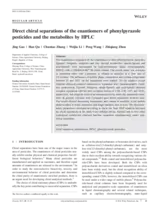 Chiral Chiralpak IB Chiral Separation of Enantiomers of Phenylpyrazole Pesticides Applications
Chiral Chiralpak IB Chiral Separation of Enantiomers of Phenylpyrazole Pesticides Applications
-
HPLC
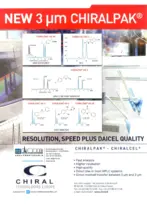 Chiral Chiralpak 3um Applications
Chiral Chiralpak 3um Applications
-
HPLC SFC
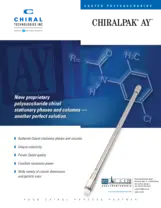 Chiral Chiralpak AY Applications
Chiral Chiralpak AY Applications
-
HPLC
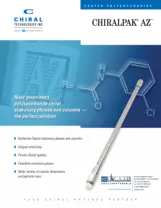 Chiral Chiralpak AZ Applications
Chiral Chiralpak AZ Applications
-
HPLC
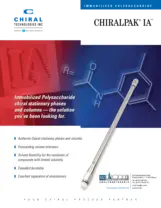 Chiral Chiralpak IA Applications
Chiral Chiralpak IA Applications
-
HPLC
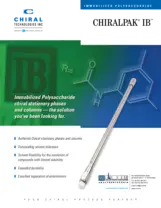 Chiral Chiralpak IB Applications
Chiral Chiralpak IB Applications
-
HPLC
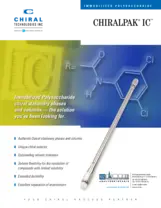 Chiral Chiralpak IC Applications
Chiral Chiralpak IC Applications
-
HPLC
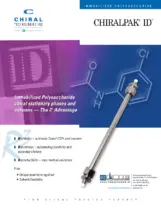 Chiral Chiralpak ID Applications
Chiral Chiralpak ID Applications
-
HPLC SFC
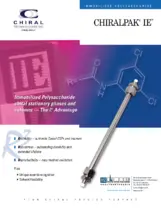 Chiral Chiralpak IE Applications
Chiral Chiralpak IE Applications
-
HPLC
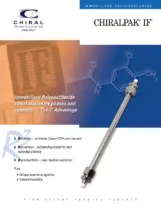 Chiral Chiralpak IF Applications
Chiral Chiralpak IF Applications
-
HPLC
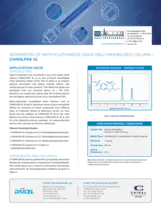 Chiral Chiralpak IG Applications
Chiral Chiralpak IG Applications
-
HPLC
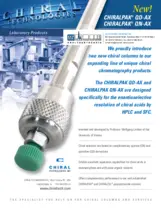 Chiral Chiralpak QD-AX & QN-AX Applications
Chiral Chiralpak QD-AX & QN-AX Applications
Technical Support
- Chiral Selectors Names & Structures 2024
- Chiral Operating Conditions for Normal Phase Columns
- Chiral Chiralpak AD-3 & AS-3 Chiralcel OD-3 & OJ-3 Instruction Manual 2013
- Chiral Chiralpak AD-H Instruction Manual 2013
- Chiral Chiralpak AD-RH Instruction Manual 2003
- Chiral Chiralpak AD Instruction Manual 2013
- Chiral Chiralpak AGP Instruction Manual 2018
- Chiral Chiralpak AS Instruction Manual 2013
- Chiral Chiralpak AS-H Instruction Manual 2013
- Chiral Chiralpak AS-RH Instruction Manual 2003
- Chiral Chiralpak AY Instruction Manual 2013
- Chiral Chiralpak AY-H Instruction Manual 2013
- Chiral Chiralpak AZ-3 Instruction Manual 2013
- Chiral Chiralpak AZ-H Instruction Manual 2013
- Chiral Chiralpak IA The new Chiral HPLC Column compatible with all solvents
- Chiral Chiralpak IA & IB & IC & ID & IE & IF & IG & IH Instruction Manual 2018
- Chiral Chiralpak IA Instruction Manual 2004
- Chiral Chiralpak IA Method Development
- Chiral Chiralpak IA-3 & IB-3 & IC-3 & ID-3 & IE-3 & IF-3 & IG-3 Instruction Manual 2013
- Chiral Chiralpak IA-U & IB-U & IC-U & IG-U Instruction Manual 2017
- Chiral Chiralpak IB Instruction Manual 2004
The right column for you - we will be happy to support you individually
Competent consultants are always at your side. Write a message to our consultants, we will get back to you and give you individual support.
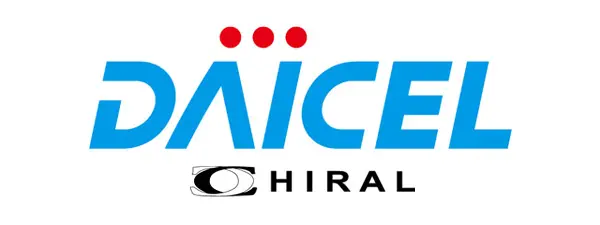
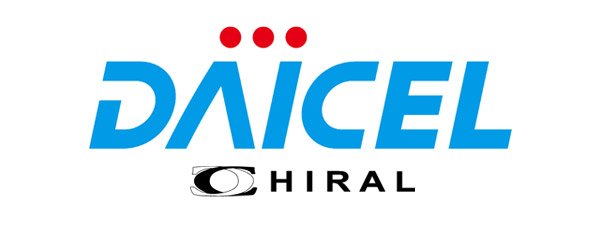
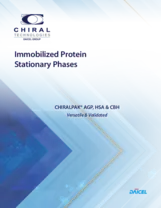 Chiral Chiralpak AGP & HSA & CNH Product List Brochure
Chiral Chiralpak AGP & HSA & CNH Product List Brochure
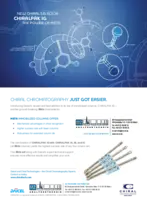 Chiral Chiralpak IG Brochure
Chiral Chiralpak IG Brochure
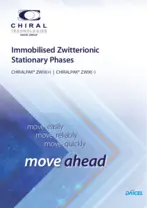 Chiral Chiralpak ZWIX Brochure
Chiral Chiralpak ZWIX Brochure
 Chiral Product List 2023 Brochure
Chiral Product List 2023 Brochure